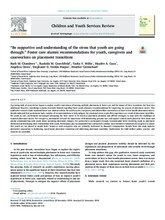Displaying 41 - 50 of 232
This qualitative research study examined foster care alumni’s advice for youth in care, caregivers, and child welfare caseworkers on how to best handle placements moves.
The objective of this study was to examine the utility of child protective services data in identifying predictors of placement disruption.
This research examined the impact of individual and relational characteristics of foster parents on permanency outcomes for children in care.
The present study is the largest and most rigorous study to date on the effects of being appointed a Court Appointed Special Advocate (CASA) on permanency outcomes of children in foster care.
Comprised of 12 videos and accompanying discussion guides, this video series features the learning from practitioners working across a range of care-related programs and practices in Cambodia.
This video shares insights from the Angkor Hospital for Children social work unit’s key learning around what leads to abandonment, how to work with families to identify and solve underlying issues, how to engage and communicate with families and how to identify risk indicators for abandonment.
In this qualitative study, attorneys, caseworkers, managers, and service providers from four jurisdictions are interviewed to understand practice and decision-making in reunification case planning and service delivery.
This paper focuses on qualitative findings on how young people in long-term foster care in Ireland interpret permanence and stability.
These Case Management Minimum Indicators provide measurable benchmarks to assess the quality of case management in humanitarian crises.
This paper explores the usefulness of undertaking a longitudinal analysis of administrative data on children in care at local authority level to determine the care pathways for children entering care, differentiating by age at entry.

